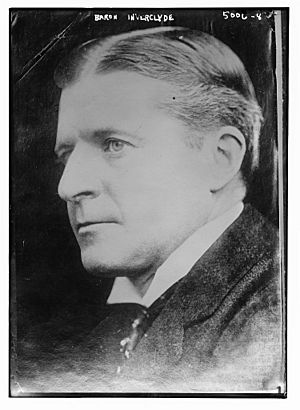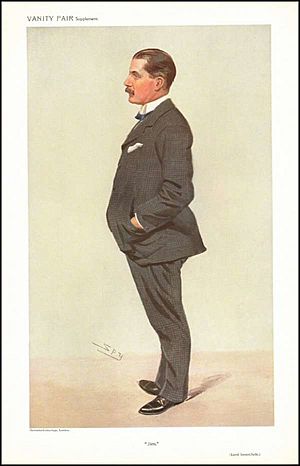James Burns, 3rd Baron Inverclyde facts for kids
James Cleland Burns (born February 14, 1864, died August 16, 1919) was an important Scottish businessman. He was the third Baron Inverclyde, a special title passed down in his family. James became Lord Inverclyde after his older brother, George, passed away in 1905. His family was famous for helping to start the Cunard Line, a well-known shipping company.
Contents
About James Burns
James, Lord Inverclyde, came from a long line of important people in Glasgow, Scotland. His family had a history of helping the city. For example, one of his great-grandfathers, Dr. Burns, was a church minister for 69 years. Another great-grandfather, Dr. Cleland, was a city leader.
His grandfather, Sir George Burns, helped start the Cunard Line. This company became famous for its steamships. James's father, Sir John Burns, was given the title of the first Lord Inverclyde in 1897 because of his family's public service.
Early Life and Business
James Burns was born in Glasgow in 1864. He went to school at Repton School. After school, he joined his family's shipping business, G. & J. Burns, Limited. He was a main director there and cared a lot about shipping.
He became the President of the Chamber of Shipping of the United Kingdom in 1899. This group represents shipping companies. In 1900, he became the head of the Glasgow Shipowners' Association. He also helped advise on new lighthouse projects.
James was a director for the Cunard Steamship Co., Ltd., and the Clydesdale Bank Ltd.. He was also involved with Lloyd's Register, which checks ships for safety. He was a member of groups for naval architects and engineers. He also helped with religious and charity work in Glasgow. In 1919, he became the head of The Worshipful Company of Shipwrights, a historic group for shipbuilders, but he passed away that same year.
Sports and Hobbies
James Burns loved sports, especially yachting. He was a leader in several yacht clubs, including the Royal Clyde Yacht Club. He was also a member of the very exclusive Royal Yacht Squadron.
He was the President of the Scottish Hockey Association. He played a big part in making hockey popular in Scotland. He was also good at cricket and lawn tennis. In winter, he enjoyed curling and would take his team to the Carsbreck bonspiel, a curling competition.
Home and Public Service
James owned a large property called Wemyss Bay. His home there was Castle Wemyss. He also had a house called Hartfield at Cove. He even leased land for hunting from the Duke of Argyll on Rosneath moor.
Lord Inverclyde held important public roles. He was the Lord Lieutenant of Dunbartonshire, which is the King's representative in the area. He was also a Justice of the Peace in several counties, helping with local law and order. In 1909, he became an Honorary Colonel for the Clyde Royal Garrison Artillery, a military group.
Family Life
On April 2, 1891, James married Charlotte Mary Emily. She was the youngest daughter of Mr. Nugent-Dunbar. They had two daughters, Emily and Muriel, and one son, John Alan Burns, who became the next Lord Inverclyde after his father.
Vanity Fair Caricature
On April 21, 1909, a cartoon drawing of Lord Inverclyde appeared in a famous magazine called Vanity Fair. It came with a short story about him:
The article said that James Burns learned a lot about shipping while working with his family's business. This knowledge made him known in the House of Lords as someone who spoke for the shipping industry. As a director of the Cunard Steamship Company, he was very skilled. The magazine even joked that fresh eggs might soon be available on Cunard ships because of him!
It also mentioned that Lord Inverclyde didn't get involved much in city politics because Glasgow meetings could be rowdy. However, he held many other important positions quietly and well. As Lord Lieutenant of Dumbarton, he did a great job helping to protect Dumbarton Castle.
The article described him as strong and someone who loved outdoor sports. It said he wished he could divide the year into two seasons: one for curling and one for tennis. But he also loved yachts and guns. He was part of the King's Bodyguard for Scotland. He had his own indoor tennis court, a grouse moor for hunting, and a lovely home at Castle Wemyss. The article ended by saying he was a "Unionist Tariff Reformer" (a type of politician) and was "incurably modest."
| Peerage of the United Kingdom | ||
|---|---|---|
| Preceded by George Burns |
Baron Inverclyde 1905–1919 |
Succeeded by John Burns |
 | Toni Morrison |
 | Barack Obama |
 | Martin Luther King Jr. |
 | Ralph Bunche |



